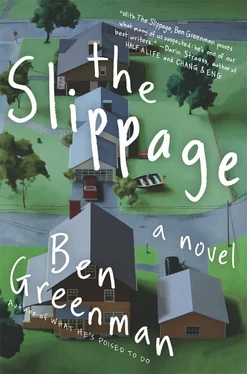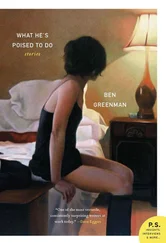William nodded and said yes, the slippery slope, and Tom interrupted him right back. “No,” he said. “The slippery slope is for politicians and propagandists. The slippage is a specific thing. It’s the moment when you start to lose your footing.” He held up a hand, rigid and horizontal, to represent the X-axis of some invisible graph. “See,” he said, “any graph is a set of expectations. It tells you what’s normal and what’s exceptional, where there are gains and losses. But what if you suddenly find that you’re plotting all your data on a graph that’s coming loose? What if the graph itself is unmoored, if you no longer know where you’re standing in relation to it?” The hand flipped so that the thumb and fingers switched positions. “Is the hand reversed now? Is it even the same hand? You don’t know if you can trust the graph, not because of its inaccuracy, but because of your disorientation. The slippage isn’t the moment when a graph turns upward or downward. It’s the moment when it turns on you.”
“I’m not sure I know what you mean.”
Tom rapped on the tabletop. “Well, then,” he said. “You’re halfway there.” He blinked fiercely. The right hand, the one that had been the baseline, fell into his lap. The performance had not gone unnoticed by those around them. The quartet of women snickered among themselves.
William woke. He rolled to his right and nearly turned an ankle standing up. The darkness was smooth, the visual equivalent of silence. He could see the outline of the dog sleeping near the entrance to the bathroom. When he was a child, he would sometimes stand in the hallway in the middle of the night and wonder if perhaps he had died. “You awake?” he said to Louisa, but Louisa wasn’t there.
He found her in their rarely used living room, sitting with her legs folded under her. The television was on, but not the volume. “Hey,” she said.
“What time is it?”
“Ten thirty? Maybe not quite. When I got home you were zonked out in bed with all your clothes on.”
“I had quite an afternoon. Long day at work, and then guess what happened.” He set the scene dramatically, starting with the color-coded graph in Tom’s studio and the gray bars on the wall. “They’re like teleporters,” he said. Louisa didn’t seem to be listening. She was holding a tube of lipstick in her hands, swiveling it up and down, and William started to feel transfixed by the way it always went back where it came from. When he got to the part where the first man had made his shaky way across the field, Louisa didn’t even look up at him. Now he was sure she wasn’t listening.
Suddenly, Louisa stood. “I need to talk to you.” She wielded the lipstick.
“Okay,” he said. “What about?”
“I need you to tell me that there’s a next step in all of this.”
“In the story? I just got to the fire.”
“I mean the land,” she said. “Our land.”
And then it came to William, all at once; he was like an explorer in a jungle at the moment the vegetation cleared. “Oh,” he said. “You want a new house.”
“I do,” she said, like she was making vows.
“But there’s no house on that land,” he said.
“Right. So we build one.”
“Build?” It was an idiot’s echo.
“I’ll make it worth your while.” She shifted so that her sweatshirt slid off one shoulder, exposing the swell of a breast.
“Come on,” he said, and she covered up, frowning. “Are you serious? You think we should build a new house?”
“People do it all the time. I told you: I peeked into one that’s just going up.”
“Right,” he said. “Because we have all the time and money in the world.”
“Is that what we need?” she said. “All the time and money in the world?”
“Can’t we redo a room here? Is it change you want?”
Her frown hadn’t lifted. “I just want to know for sure that life is moving forward.”
“What’s the alternative?”
Louisa stood, smoothed her shirt in front, and turned away, murmuring something he couldn’t quite hear.
“What?” he said.
“There’s nothing here for me.” She headed down the hall.
“So that’s it? That’s our evening?”
“It’s a bed you made,” she said in a gratified way. “Lie in it. I can’t stay out here with you when you’re being a child.” She forced capital letters onto the last few words.
Blondie lolled beneath one of the front windows and William went to pet her. Kneeling there, he took a measure of the night sky. There was a nearly full moon, a coin no one could spend, and he moved side to side to hang it in the center of the pane. He had read recently that Earth might have a second moon, invisible to the naked eye. The scope of it all disconcerted him. He couldn’t even really get a grasp on the minuscule portion of existence in his window. William was increasingly convinced that he was a man of limits.
William usually treasured his weekend mornings, grateful for the extra hours in bed, but the image of the man coming across the field was still high in his mind, and he got to the shower by eight, grateful for the water. The late news had furnished some details, and more were on the radio in the morning. The man was not Andy. His name was Karim and he had been one of the security guards at the building. He had been rushed to the hospital, only to be pronounced dead a few minutes later.
The deck was the most reliable place of comfort William knew, and he sat there, the dog at his feet. The sky was filled with dark clouds in strange shapes, and the sun coming through them gave the tubs the look of old bone. “Garcia,” the radio said, calling the security guard by his last name, “is survived by one son, age fifteen. His wife was killed last year in a car accident.”
William’s parents had died at either end of his twenties, both uneventfully, if such a thing was possible. His father’s death had come as a sorrow but not a surprise; he was a cancer survivor by the time William was born, a young man who moved like someone much older. William remembered him as pale, precise, and almost pathologically quiet, as if he were hiding from something and worried that the smallest noise would reveal his location. Maybe he was: between William’s junior and senior years in college, the cancer had returned with new ferocity. William, home for the summer, visited him frequently in the hospital, unsure what to say to the silent figure stretched out on the bed. He did not know how he had come from the man, who hardly seemed to have enough energy to produce a sentence, let alone a child. On the day before William went back to school, his father clasped one of William’s nervous hands between both of his papery ones. “Thank you,” he said, his voice filled with emotionlessness. It was a humiliation William would never forget and almost all he could remember at the funeral a month later.
His mother had been quiet in life as well, but when she was widowed, a dam within her opened, and judgments poured forth: the art on the wall of the lawyer’s office was depressing (William agreed), the waitress at lunch dressed like a streetwalker (William disagreed), the oceans had been polluted beyond repair by the shortsighted greed of the human species (William felt the matter needed more study).
Then she fell ill, with a different cancer from the one that had killed his father. The treatment took her hair and gave her the look of a fortune-teller, scarf wrapped around a head that seemed larger than ever, and that lent her pronouncements a dramatic weight. When she visited his apartment, she stood in the front doorway and said that it was no place for him if he wanted to be consequential in the world. “Get yourself a house,” she said. “Don’t be a coward.”
Читать дальше












